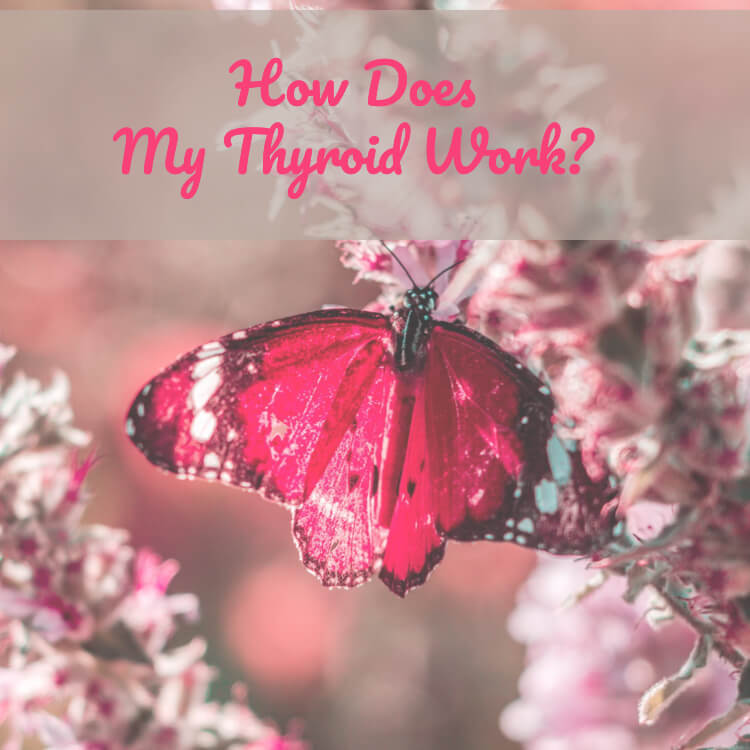How Does My Thyroid Work?

Hey Hey y’all!! This is one of my favorite topics. It’s such a favorite topic I created a free eBook about how to start the healing process if you have Hashimoto’s – the most common cause of hypothyroidism… Anyhow… This is the first in a series about the Thyroid, how it works when it’s healthy, what labs are necessary to actually diagnose a problem with the thyroid, what happens when it doesn’t work right, how it gets sick in the first place and more. No longer will you wonder, “how does my thyroid work?”.
Thyroid issues are one of the most misdiagnosed and misunderstood health concerns. Fatigue, weight gain, constipation and hair loss are just a few of the lovely symptoms associated with a malfunctioning thyroid. Thyroid function seems complicated, but in reality, it’s pretty simple.
What is it and what does it do?
The thyroid gland is a butterfly shaped gland located around your Adam’s apple. It controls your metabolism and many cellular functions inside your cells, which in turn, make you live.

How does my it work?
The Players:
- The brain parts, Pituitary and Hypothalamus
- Your Bloodstream
- The Thyroid
- T4 = Thyroid Hormone
- T3 = Active Form of Thyroid Hormone
- Free T4 = Available Thyroid Hormone
- Free T3 = Available and ACTIVE Thyroid Hormone
- TSH = Thyroid Stimulating Hormone
The Story:
- Your Pituitary and the Hypothalamus regulate many hormones and neurotransmitters in your body.
- The Pituitary and Hypothalamus can sense how much T4 is circulating in your blood.
- T4 is our main hormone. Your thyroid also produces a small amount of T3. Hang with me…
- The amount of T4 needed for the body depends on many factors, like stress, exercise, sleeping vs being awake, etc. Your body will respond to the demands with differing levels of T4 throughout the day.
- Let’s say you go and workout. You will need MORE T4. Onward…
- Your healthy pituitary will respond by releasing Thyroid Stimulating Hormone (TSH).
- TSH tells it to increase production of T4.
- Your healthy gland will respond with an increase in T4 (and small amount of T3) production released into your bloodstream.
- When the pituitary senses the levels are good, it will send out a steady TSH signal.
- If your body needs less T4, your Pituitary will send less TSH, and your healthy thyroid will produce less T4.
That’s the basic loop. Your pituitary senses what is happening in your body and sends out the signal, TSH, to change thyroid hormone production based on what your body needs.

What’s the difference between T3 and T4
A healthy gland produces T4 (80%) and T3 (20%).
- T3 is the most active form of the thyroid hormones. It is produced your in the body by converting T4 to T3. This is called Conversion, and yes there can be issues. I know this sounds complicated. Stay with me…
- It’s as easy as an enzyme, called deiodinase, that takes one molecule of iodine off the T4 molecule and voila, it becomes T3.
- If your break down that enzyme name: DE – to undo; iodi – referring to iodine; -ase – refers to enzymes in general. So, it undoes the iodine from the T4 molecule leaving T3.
- Now, all hormones run around attached to a protein “carrier” molecule. This is the hormone’s Uber.
- As T3 is getting ready to go inside the cell the T3 molecule gets out of it’s Uber, for carrier protein, and becomes Free T3.
- This process is nutrient dependent. The primary nutrients involved are zinc, iodine, tyrosine, selenium, vitamin D, B-complex, and iron. Much of the conversion takes place in the kidney, liver and GI-tract.
T3 Conversion Issues
There are many places where this process can be interrupted by illness, pregnancy, poor lifestyle habits which create stress, mental and emotional stress, and dietary deficiencies. The most common symptoms when you have a thyroid issue are:
- Fatigue
- Dry hair, skin
- Constipation
- Weight Gain
- Period changes
The way thyroid issues are diagnosed is a controversial subject. In my next blog I will address what can mess up the thyroid gland and the pituitary. I will then go into the diagnostic labs necessary to accurately determine the thyroid issue. We will work our way through everything you always wanted to know about the thyroid.
If you’re looking for solutions, check out my FREE eBook: The Top 5 Things You Need to Know to Kick Hashimoto’s Out of Your Body.
I have had a hypothyroidism for over 25 yrs i take levothyroxine what foods should i eat.. my hair falls out every day so annoying I prAy I will be healed of this some day with God all things are possible….
Christine – sign up for my free ebook at the top of my homepage – it will give you a great place to start!! I will have an online course very soon that will address the deeper issues of Hashimoto’s!